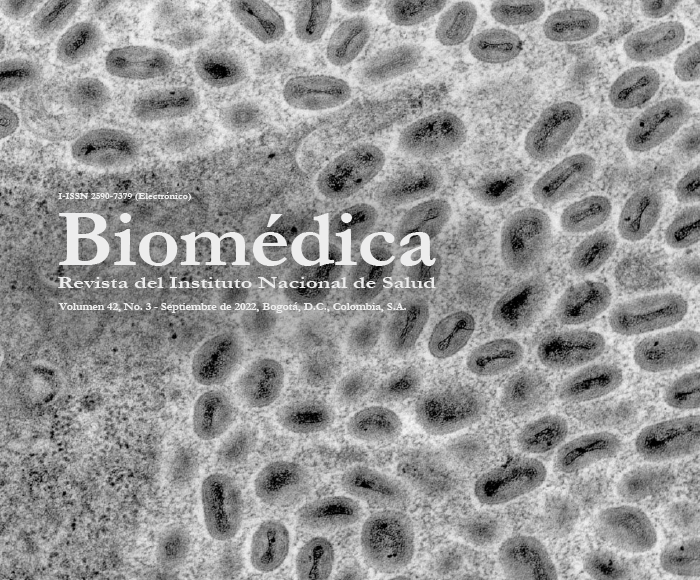Early-onset generalized dystonia caused by a new mutation in the KMT2B gene: Case report
Abstract
Introduction: KMT2B-related dystonia is a recently described subtype of focal-onset dystonia in the lower limbs, evolving into a generalized form with cervical, oropharyngeal involvement, dysarthria, swallowing disorder and intellectual disability.
Clinical case: We describe the case of a 10-year-old female patient, without a history of consanguinity or neurological disease. She manifested abnormal gait and dystonia with focal onset and progressive course with evolution into generalized dystonia, affecting orofacial and bulbar muscles, significant alteration of language and swallowing.
Metabolic and systemic studies, including neuroimaging, were found to be normal. A complete genomic sequencing study was performed identifying a new, probably pathogenic, heterozygous variant in the KMT2B gene, c.1205delC, p. (Pro402Hisfs*5), causing displacement in the reading frame, a finding that explains the patient’s phenotype and it is associated to autosomal dominant childhood-onset dystonia-28.
Conclusion: We report a new heterozygous mutation in the KMT2B gene as a cause of generalized early-onset dystonia not reported in the literature until the date. The diagnosis of this pathology has implications for the treatment and prognosis of patients, given that therapeutic strategies implemented early can prevent the fast deterioration and severe course of this disease.
Downloads
References
Meyer E, Carss KJ, Rankin J, Nichols JME, Grozeva D, Joseph AP, et al. Mutations in the histone methyltransferase gene KMT2B cause complex early-onset dystonia. Nat Genet. 2017;49:223-37. https://doi.org/10.1038/ng.3740
Carecchio M, Invernizzi F, González-Latapi P, Panteghini C, Zorzi G, Romito L, et al. Frequency and phenotypic spectrum of KMT2B dystonia in childhood: A single-center cohort study. Mov Disord. 2019;34:1516-27. https://doi.org/10.1002/mds.27771
Gorman KM, Meyer E, Kurian MA. Review of the phenotype of early-onset generalised progressive dystonia due to mutations in KMT2B. Eur J Paediatr Neurol. 2018;22:245-56. https://doi.org/10.1016/j.ejpn.2017.11.009
Kawarai T, Miyamoto R, Nakagawa E, Koichihara R, Sakamoto T, Mure H, et al. Phenotype variability and allelic heterogeneity in KMT2B -associated disease. Parkinsonism Relat Disord. 2018;52:55-61. https://doi.org/10.1016/j.parkreldis.2018.03.022
Marogianni C, Georgouli D, Dadouli K, Ntellas P, Rikos D, Hadjigeorgiou GM, et al. Identification of a novel de novo KMT2B variant in a Greek dystonia patient via exome sequencing genotype-phenotype correlations of all published cases. Mol Biol Rep. 2021;48:371-9. https://doi.org/10.1007/s11033-020-06057-3
Zech M, Jech R, Havránková P, Fečíková A, Berutti R, Urgošík D, et al. KMT2B rare missense variants in generalized dystonia. Mov Disord. 2017;32:1087-91. https://doi.org/10.1002/mds.27026
Zech M, Boesch S, Jochim A, Weber S, Meindl T, Schormair B, et al. Clinical exome sequencing in early-onset generalized dystonia and large-scale resequencing follow-up. Mov Disord. 2017;32:549-59. https://doi.org/10.1002/mds.26808
Powis AZ, Towne MC, Hagman KDF, Blanco K, Palmaer E, Castro A, et al. Clinical diagnostic exome sequencing in dystonia: Genetic testing challenges for complex conditions. Clin Genet. 2020;97:305-11. https://doi.org/10.1111/cge.13657
Dafsari HS, Sprute R, Wunderlich G, Daimagüler HS, Karaca E, Contreras A, et al. Novel mutations in KMT2B offer pathophysiological insights into childhood-onset progressive dystonia. J Hum Genet. 2019;64:803-13. https://doi.org/10.1038/s10038-019-0625-1
Mohammad SS, Paget SP, Dale RC. Current therapies and therapeutic decision making for childhood-onset movement disorders. Mov Disord. 2019;34:637-56. https://doi.org/10.1002/mds.27661
Akano E, Otite F, Lavenstein B, Ehrlich D. Indications, outcomes and cost of pediatric deep brain stimulation surgeries in the United States: An analysis of the Kids’ inpatient sample (P4.8-021). Neurology. 2019;92:4.8-021.
Some similar items:
- Nancy Gélvez, Johana Acosta, Greizy López, Derly Castro, Juan Carlos Prieto, Martha Bermúdez, Marta L. Tamayo, Phenotypic and molecular characterization of a Colombian family with phenylketonuria , Biomedica: Vol. 36 No. 3 (2016)
- Blair Ortiz, Yesyka Jaramillo, Christian Rojas, X-linked epileptic syndrome by protocadherin 19 mutation associated with leukoencephalopathy and posterior reversible tractopathy , Biomedica: Vol. 38 No. 4 (2018)
- Luz Yaqueline Ladino, Johanna Galvis, Diana Yasnó, Adriana Ramírez, Orietta Ivonne Beltrán, A pathogenic homozygous variant of the BBS10 gene in a patient with Bardet Biedl syndrome , Biomedica: Vol. 38 No. 3 (2018)

Copyright (c) 2022 Biomedica

This work is licensed under a Creative Commons Attribution 4.0 International License.
| Article metrics | |
|---|---|
| Abstract views | |
| Galley vies | |
| PDF Views | |
| HTML views | |
| Other views | |

























